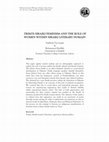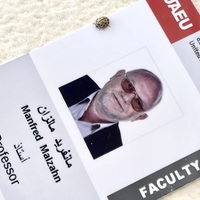Books by Nukhbah Taj Langah

Film, Media and Representation in Postcolonial South Asia: Beyond Partition, 2021
This volume brings together new studies and interdisciplinary research on the changing mediascape... more This volume brings together new studies and interdisciplinary research on the changing mediascapes in South Asia. Focusing on India, Pakistan, and Bangladesh, it explores the transformations in the sphere of cinema, television, performing arts, visual cultures, cyber space and digital media, beyond the traumas of the partitions of 1947 and 1971.
Through wide-ranging essays on soft power, performance, film, and television; art and visual culture; and cyber space, social media, and digital texts, the book bridges the gap in the study of the postcolonial and post-Partition developments to reimagine South Asia through a critical understanding of popular culture and media. The volume includes scholars and practitioners from the subcontinent to foster dialogue across the borders, and presents diverse and in-depth studies on film, media and representation in the region.
This book will be useful to scholars and researchers of media and film studies, postcolonial studies, visual cultures, political studies, partition history, cultural studies, mass media, popular culture, history, sociology and South Asian studies, as well as to media practitioners, journalists, writers, and activists.
Papers by Nukhbah Taj Langah
Routledge eBooks, Feb 9, 2024
This chapter is focused on childhood trauma experienced by female protagonists depicted in partit... more This chapter is focused on childhood trauma experienced by female protagonists depicted in partition fiction by selected Indian and Pakistani writers. Firstly, we discuss Bapsi Sidhwa’s 8-year-old protagonist Lenny (Ice Candy Man), whose ableism paralleled by partition violence creates the basis of her childhood trauma. Secondly, we associate Lenny’s childhood experiences with the sexual abuse of young girls in selected partition stories by Saadat Hassan Manto and Ismat Chughtai.
South Asia: Journal of South Asian Studies, Jan 7, 2024
ABSTRACT
This paper discusses the settlement of the first and second generations of Siraiki spea... more ABSTRACT
This paper discusses the settlement of the first and second generations of Siraiki speakers in London and their attachment to their mother tongue as a key identity marker. Their convoluted SiraikiPakistani-British identities have been explored through their
attempts to transfer Siraiki to their second generation through communication, literature and cultural practices. The ethnographic data collected from London is discussed in the light of the first generation’s experiences with social hierarchies, inequality, power dynamics, identity politics, and the second generation’s fundamental struggle
to remain connected with its mother tongue and mother culture.

Pakistan journal of women's studies, May 30, 2020
This paper applies textual analysis and an ethnographic approach to explore the role of women wit... more This paper applies textual analysis and an ethnographic approach to explore the role of women within the Siraiki cultural and literary domain. The debate about Siraiki as an ethno linguistic identity is a postcolonial development in Pakistan. Siraiki language speakers identify themselves being distinct from any other ethnic group in Pakistan. Based on this claim they resist the hegemonic control of Punjabi-Mohajir over their resources, area and disregard towards their literary and cultural tradition. The demand for a new Siraiki province within the federation of Pakistan by bifurcating Punjab is an outcome of this lack of political recognition. We contend that due to social taboos and patriarchal pressures, these women are experiencing suppression that results in limited visibility within mainstream literary circles. The lack of both appreciation and mentorship for their creative outputs has resulted in the dearth of literature produced by Siraiki women writers. The objective of this study is to indicate how this oppression can result in an enactment of power through creative writing. In order to substantiate our argument, we rely on selected works by Iqbal Bano, Shabnam Awan and Mussarat Kalanchvi. In the process, we also attempt to theorize an indigenous manifestation of feminist intent of these Siraiki writers as Trimti.
Southeast Asian review of English, Jul 16, 2023
This special issue of Southeast Asian Review (SARE) focuses on two main concerns arising from the... more This special issue of Southeast Asian Review (SARE) focuses on two main concerns arising from the historical context of South Asia: 'nationalism' and 'secularism,' both of which have continued to influence South Asia's literary trajectory for decades. Therefore, these interconnected terms are the essential and indispensable entry points for academic interventions in South Asia. While the concept of a nation became more distinct following the French

Pakistan Journal of Women's Studies: Alam-e-Niswan, 2020
This paper applies textual analysis and an ethnographic approach to explore the role of women wit... more This paper applies textual analysis and an ethnographic approach to explore the role of women within the Siraiki cultural and literary domain. The debate about Siraiki as an ethno linguistic identity is a postcolonial development in Pakistan. Siraiki language speakers identify themselves being distinct from any other ethnic group in Pakistan. Based on this claim they resist the hegemonic control of Punjabi-Mohajir over their resources, area and disregard towards their literary and cultural tradition. The demand for a new Siraiki province within the federation of Pakistan by bifurcating Punjab is an outcome of this lack of political recognition. We contend that due to social taboos and patriarchal pressures, these women are experiencing suppression that results in limited visibility within mainstream literary circles. The lack of both appreciation and mentorship for their creative outputs has resulted in the dearth of literature produced by Siraiki women writers. The objective of thi...
Poetry as Resistance, 2020

This volume brings together new studies and interdisciplinary research on the changing mediascape... more This volume brings together new studies and interdisciplinary research on the changing mediascapes in South Asia. Focusing on India, Pakistan, and Bangladesh, it explores the transformations in the sphere of cinema, television, performance arts, visual cultures, cyber space, and digital media, beyond the traumas of the partitions of 1947 and 1971. Through wide-ranging essays on soft power, performance, film, and television; art and visual culture; and cyber space, social media, and digital texts, the book bridges the gap in the study of the postcolonial and post-Partition developments to reimagine South Asia through a critical understanding of popular culture and media. The volume includes scholars and practitioners from the subcontinent to foster dialogue across the borders, and presents diverse and in-depth studies on film, media and representation in the region. This book will be useful to scholars and researchers of media and film studies, postcolonial studies, visual cultures, political studies, partition history, cultural studies, mass media, popular culture, history, sociology and South Asian studies, as well as to media practitioners, journalists, writers, and activists.
The Magic of Bollywood: At Home and Abroad, 2012

Something to Tell You, Kureishi's flawed but enjoyable fifth novel, centers around the attemp... more Something to Tell You, Kureishi's flawed but enjoyable fifth novel, centers around the attempts of the mixed-race character Jamal to prevent the coming to light of a violent act of his youth. The novel flashes back to the "mid-1970s" (Kureishi 2008: 31) to recount Jamal' s relationship with Ajita, a wealthy Indian student, who eventually confesses to her sexual abuse at the hands of her father. So angered is Jamal by her story that he enlists the help of two friends, Wolf and Valentin, and they resolve to rough up the father. Things do not go according to plan, however, as Ajita's father assumes the three are trade union activists angry at his draconian behavior as a factory boss, and he dies of a heart attack in the middle of the altercation. Wolf and Valentin flee to France, while Ajita, distraught about her father's death, relocates to Bombay; and Jamal spends the next few decades living in fear of his "murder" being exposed. Flash forward to t...
Transcultural Humanities in South Asia

Routledge India; 1st edition (July 29, 2021), 2021
This volume brings together new studies and interdisciplinary research on the changing mediascape... more This volume brings together new studies and interdisciplinary research on the changing mediascapes in South Asia. Focusing on India, Pakistan, and Bangladesh, it explores the transformations in the sphere of cinema, television, performance arts, visual cultures, cyber space, and digital media, beyond the traumas of the partitions of 1947 and 1971. Through wide-ranging essays on soft power, performance, film, and television; art and visual culture; and cyber space, social media, and digital texts, the book bridges the gap in the study of the postcolonial and post-Partition developments to reimagine South Asia through a critical understanding of popular culture and media. The volume includes scholars and practitioners from the subcontinent to foster dialogue across the borders, and presents diverse and in-depth studies on film, media and representation in the region. This book will be useful to scholars and researchers of media and film studies, postcolonial studies, visual cultures, ...
Film, Media, and Representation in Postcolonial South Asia, 2021

Indian Foreign Affairs Journal, Apr 1, 2013
Nukhbah Taj Langah, Poetry as Resistance: Islam and Ethnicity in Postcolonial Pakistan (New Delhi... more Nukhbah Taj Langah, Poetry as Resistance: Islam and Ethnicity in Postcolonial Pakistan (New Delhi: Routledge, 2012), Pages : 271, Price: Rs 695.00.One of the strategies adopted by 'the establishment' in Pakistan to prevent Nawaz Sharif from coming to power was to divide Punjab, the most populous province of Pakistan and pocket borough of Sharifs, into smaller provinces. This was to be achieved by creating a province for South Punjab or Bahawalpur, or both. For a long time, the Siraiki-speaking population in Southern Punjab has been agitating for the creation of a Siraiki province. However, 'the establishment' perceives that a Siraiki province will provide further fillip to various ethno-linguistic fires already ablaze in Pakistan and hence, it wants to resurrect the Bahawalpur state and create a Southern Punjab state, a geographical entity without any ethnic connotations. The Parliamentary Commission on New Provinces recommended the creation of the 'Bahawalpur Janoobi Punjab' province, which, if created would not be linguistically homogenous and would not completely satisfy the aspirations of the Siraiki- speaking population, even though they would arguably be a majority in the new province. Unlike 'Siraikistan', the new geographical entity would have lessened the pressure on the government to merge the Siraiki-speaking regions of Khyber Pakhtoonkhwa (KP) into the new province, a proposition that the government in Peshawar has strongly rejected. However, the election results have indicated that the demand for a mere geographical province devoid of ethno-linguistic identity is not supported by the population. In fact, the election results and the huge victory by Nawaz Sharif's supporters in the region have raised serious questions about the strength of Siraiki nationalism.The Pakistani state right from its creation in 1947 has had problems with the ethnic aspirations of its population. It has often tried to subsume the ethnic identities of its populace within an all-inclusive Islamic identity. As the Mohajir and Punjabi elites have dominated the Pakistani polity, they have tried to perpetuate a domination of their lingua franca, namely Urdu and Punjabi. They have generally refused to accommodate the linguistic aspirations of other ethnic groups. Siraiki is spoken by a large population in Southern Punjab, who consider themselves to be a separate ethno-linguistic group and have been demanding a separate state since the 1960s. Although, Siraiki speakers inhabit parts of Sindh, Balochistan and Khyber Pakhtoonkhwa, the heartland of Siraiki culture remains the former princely state of Bahawalpur. Like other ethnic minorities in Pakistan, the Siraikis argue that their culture is being suppressed and their economic resources are being exploited by Punjab. They demand usage of their language in official documents, on radio and television.Within Punjab, the bulk of jobs and funds are cornered by Northern and Central Punjab. Consequently, the Siraikis have been demanding quotas in jobs and the formation of a Siraiki regiment in the army. The region has hardly any industries and continues to be underdeveloped despite producing a substantial proportion of cotton and wheat, the two main crops of Pakistan. The region has not been compensated for the loss of the waters of the Sutluj and the Beas, which used to flow through the region. The Siraikis feel that their distinctive ethno-linguistic identity has been supressed by the civil and military establishment of Pakistan, which has been dominated by the Punjabis.They attribute this to their under-representation in the Pakistani bureaucracy and the army, which recruits primarily from Northern Punjab. Many Punjabis contend that Siraiki is not a distinct language, but merely a dialect of Punjabi. Islamicised political groups have in any case tried to undermine the ethno-linguistic identities of the populace, as they have viewed linguistic nationalism as the very negation of the 'Two Nation Theory'. …











Uploads
Books by Nukhbah Taj Langah
Through wide-ranging essays on soft power, performance, film, and television; art and visual culture; and cyber space, social media, and digital texts, the book bridges the gap in the study of the postcolonial and post-Partition developments to reimagine South Asia through a critical understanding of popular culture and media. The volume includes scholars and practitioners from the subcontinent to foster dialogue across the borders, and presents diverse and in-depth studies on film, media and representation in the region.
This book will be useful to scholars and researchers of media and film studies, postcolonial studies, visual cultures, political studies, partition history, cultural studies, mass media, popular culture, history, sociology and South Asian studies, as well as to media practitioners, journalists, writers, and activists.
Papers by Nukhbah Taj Langah
This paper discusses the settlement of the first and second generations of Siraiki speakers in London and their attachment to their mother tongue as a key identity marker. Their convoluted SiraikiPakistani-British identities have been explored through their
attempts to transfer Siraiki to their second generation through communication, literature and cultural practices. The ethnographic data collected from London is discussed in the light of the first generation’s experiences with social hierarchies, inequality, power dynamics, identity politics, and the second generation’s fundamental struggle
to remain connected with its mother tongue and mother culture.
Through wide-ranging essays on soft power, performance, film, and television; art and visual culture; and cyber space, social media, and digital texts, the book bridges the gap in the study of the postcolonial and post-Partition developments to reimagine South Asia through a critical understanding of popular culture and media. The volume includes scholars and practitioners from the subcontinent to foster dialogue across the borders, and presents diverse and in-depth studies on film, media and representation in the region.
This book will be useful to scholars and researchers of media and film studies, postcolonial studies, visual cultures, political studies, partition history, cultural studies, mass media, popular culture, history, sociology and South Asian studies, as well as to media practitioners, journalists, writers, and activists.
This paper discusses the settlement of the first and second generations of Siraiki speakers in London and their attachment to their mother tongue as a key identity marker. Their convoluted SiraikiPakistani-British identities have been explored through their
attempts to transfer Siraiki to their second generation through communication, literature and cultural practices. The ethnographic data collected from London is discussed in the light of the first generation’s experiences with social hierarchies, inequality, power dynamics, identity politics, and the second generation’s fundamental struggle
to remain connected with its mother tongue and mother culture.